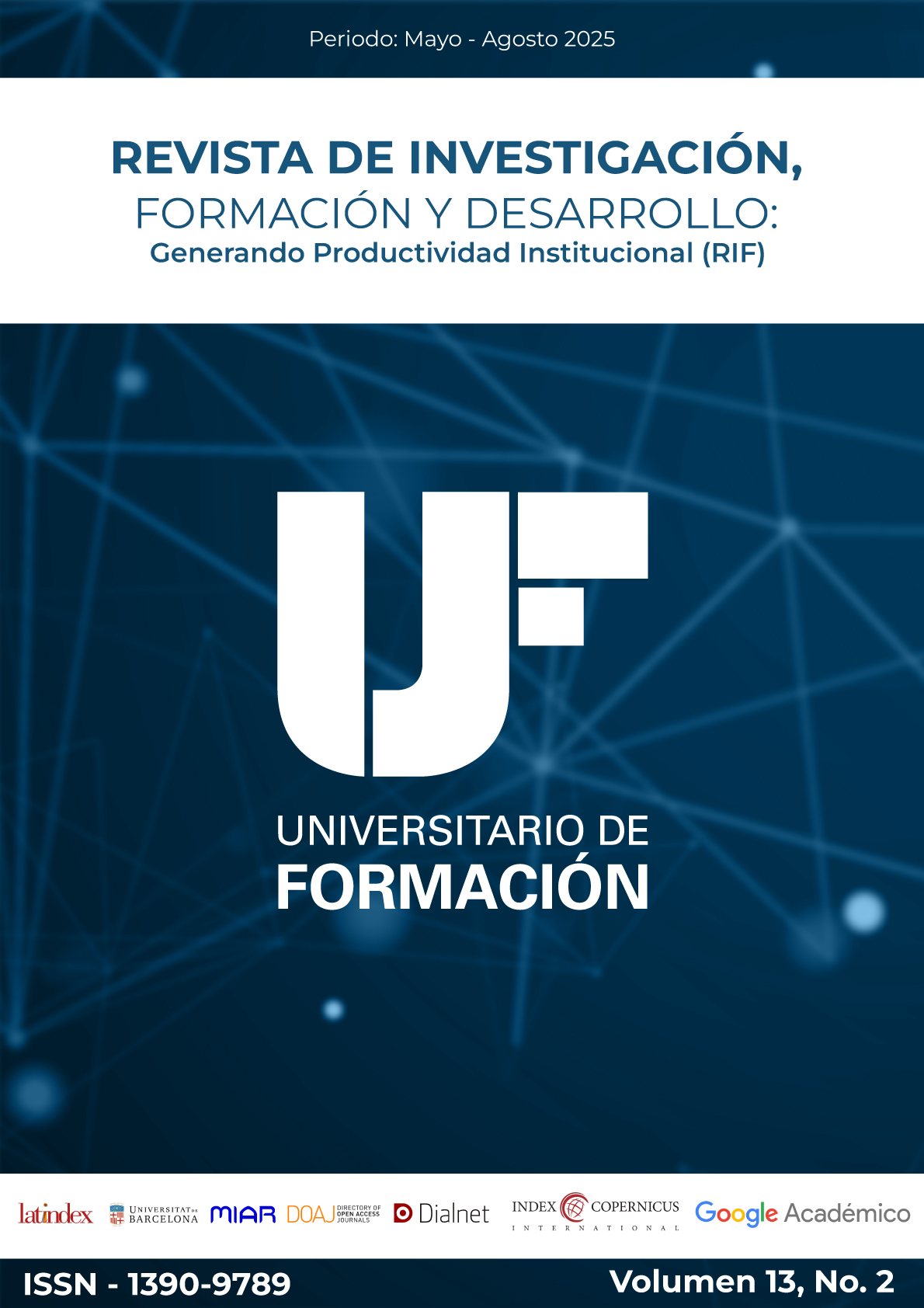Application of AI in basic education.
Main Article Content
Abstract
The study analyzes the role of artificial intelligence (AI) and its transformative impact on pedagogical processes in basic education. A systematic review framework of recent academic literature (2023–2025) was employed to identify the benefits, challenges, and pedagogical requirements associated with the integration of AI in school settings. The findings highlight the transformative potential of AI in the personalization of learning, curricular and instructional adjustment or redesign, and the provision of automated and neurofunctional feedback. The study also identified limitations related to the limited availability of specialized teacher training and the absence of institutional policies aligned with the educational use of AI. It is concluded that the effective incorporation of AI in basic education requires a sustainable training model and an organizational culture that fosters educational innovation through the integration of critical pedagogy and ethics.
Article Details

This work is licensed under a Creative Commons Attribution-NonCommercial-ShareAlike 4.0 International License.
Este trabajo tiene licencia DE Atribución/Reconocimiento-NoComercial-CompartirIgual 4.0 Internacional. CC BY-NC-SA 4.0.
How to Cite
References
Acurio, J. (2024). Access to digital teaching material and integration of Information and Communication Technologies during confinement by Covid 19 in students with visual disabilities from the Peruvian department of Puno. ESPACIOS EN BLANCO-SERIE INDAGACIONES, 34(1), 243-258. https://doi.org/10.37177/UNICEN/EB34-386
Barroso Moreno, C., Mendoza Carretero, M. R., Sáenz-Rico De Santiago, B., & Rayón Rumayor, L. (2023). Gamificación-educación: El poder del dato. El profesorado en las redes sociales. RIED-Revista Iberoamericana de Educación a Distancia, 27(1), 373-396. https://doi.org/10.5944/ried.27.1.37648
Bernilla Rodriguez, E. B. (2024). Teachers Facing Artificial Intelligence in a Public University in Northern Peru. Educación, 33(64), 8-28. https://doi.org/10.18800/educacion.202401.m001
Caballero Alarcón, F. A., & Brítez Carli, R. (2024). Artificial Intelligence in the Improvement of Teaching and Learning, Ministry of Education and Science. Academo (Asunción), 11(2), 99-108. https://doi.org/10.30545/academo.2024.may-ago.1
Cepeda Campoverde, E. V., Durán Núñez, Y. I., & Ocaña Ocaña, A. (2025). Uses and perspectives of artificial intelligence in the teaching community at the University of Guayaquil. Ñawi: arte diseño comunicación, 9(1), 151-165. https://doi.org/10.37785/nw.v9n1.a9
Delgado Togra, D. S., Salazar Moreno, J. M., Herrera Herrera, L. d A., Delgado Togra, D. S., Salazar Moreno, J. M., & Herrera Herrera, L. d A. (2021). Las herramientas web 2.0 en el desarrollo de habilidades lectoras. Horizontes Revista de Investigación en Ciencias de la Educación, 5(19), 668-676. https://doi.org/10.33996/revistahorizontes.v5i19.227
Fernandez-Arroyo, J., Rodríguez-Marín, F., García, A., & Solís-Espallargas, C. (2021). Perspectives of pre-service teachers on learning to teach Science through Inquiry-based Education. REVISTA FUENTES, 23(2), 190-203. https://doi.org/10.12795/revistafuentes.2021.9606
Forero-Corba, W., & Negre Bennasar, F. (2023). Técnicas y aplicaciones del Machine Learning e Inteligencia Artificial en educación: Una revisión sistemática. RIED-Revista Iberoamericana de Educación a Distancia, 27(1), 209-253. https://doi.org/10.5944/ried.27.1.37491
Geanni, E. (2023). La IA generativa y el futuro de la educación—UNESCO Biblioteca Digital. UNESCO. https://doi.org/10.54675/ACWQ6815
Isea Arguelles, J. J., Duque Rodríguez, J. A., Piña Ferrer, L. S., Atencio González, R. E., Isea Arguelles, J. J., Duque Rodríguez, J. A., Piña Ferrer, L. S., & Atencio González, R. E. (2024). Análisis de la Inteligencia artificial en la transformación de la enseñanza y aprendizaje educativa. Conrado, 20(100), 179-185.
Lopez-Aguilar, D., Delgado-Garcia, M., & Garcia-Prieto, F. (2024). Convergences and divergences in the digital competence of teachers in training. CAMPUS VIRTUALES, 13(1), 9-24. https://doi.org/10.54988/cv.2024.1.1112
Reza Flores, R. A., & Guemez Peña, M. A. (2024). Aprendizaje Basado en Modelización asistido con Inteligencia Artificial en las Ciencias Naturales: Propuesta de intervención neurodidáctica. Praxis Educativa, 19, 1-19. https://doi.org/10.5212/PraxEduc.v.19.22722.011
Villalba Gómez, J. A. (2024). Emerging bioethic problems with artificial intelligence. Diversitas: Perspectivas en Psicología, 12(1), 137-147. https://doi.org/10.15332/s1794-9998.2016.0001.10

